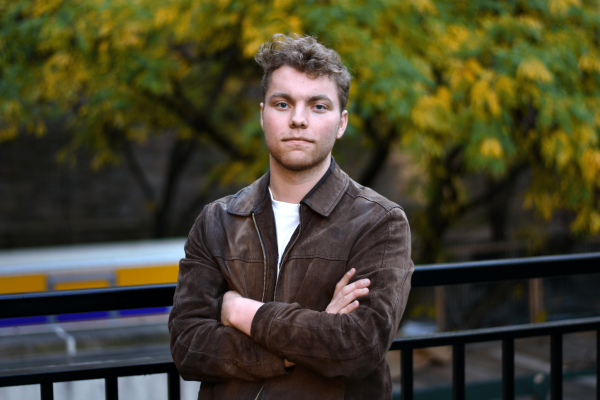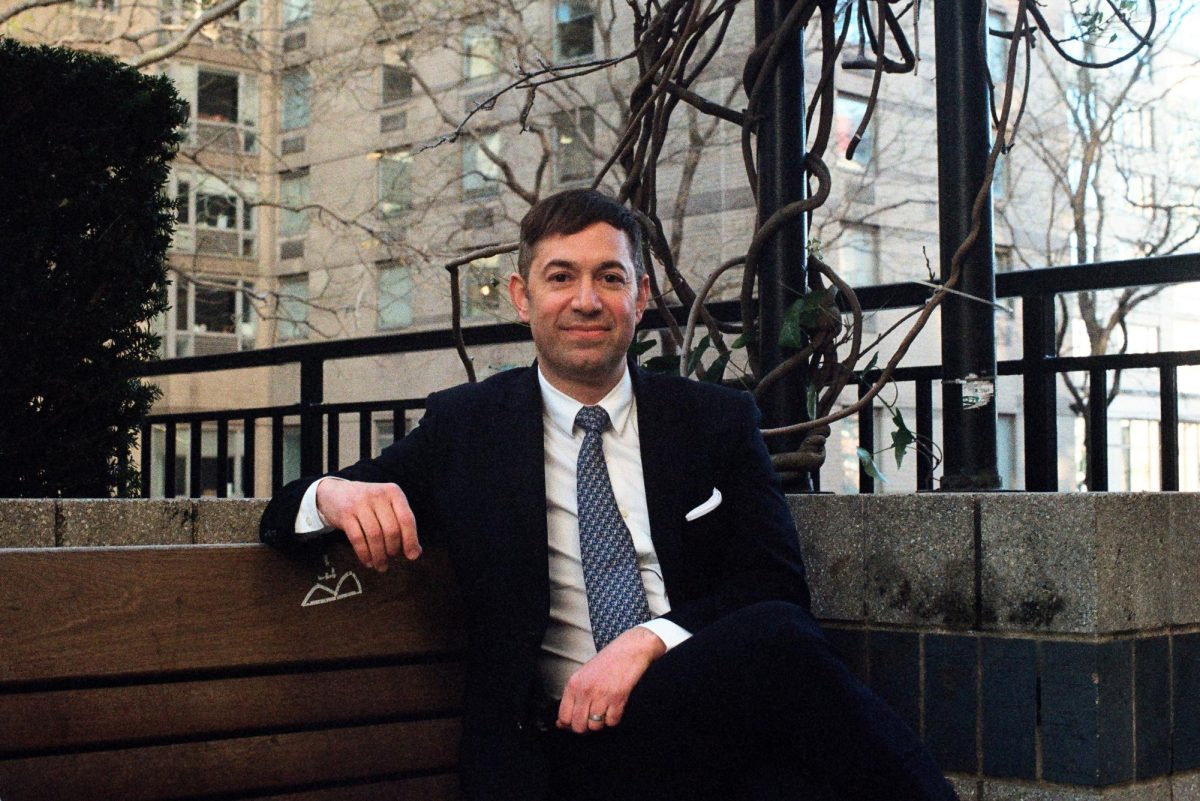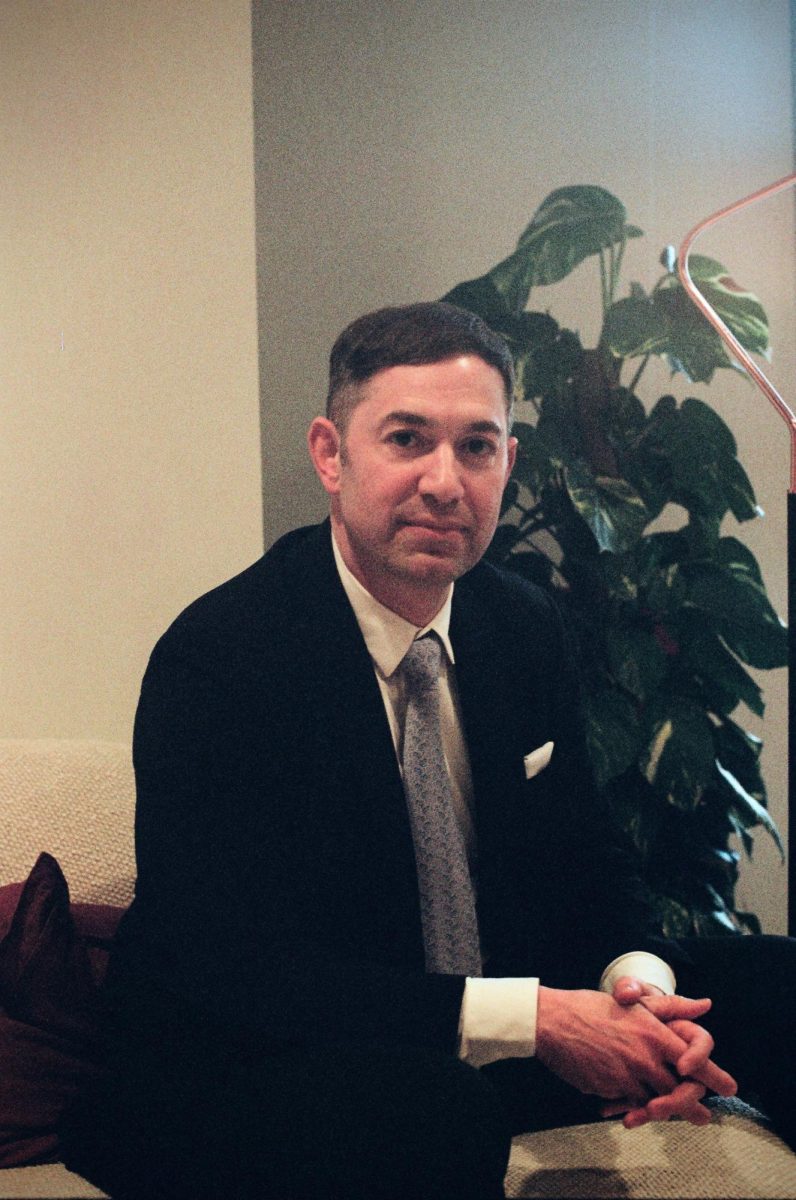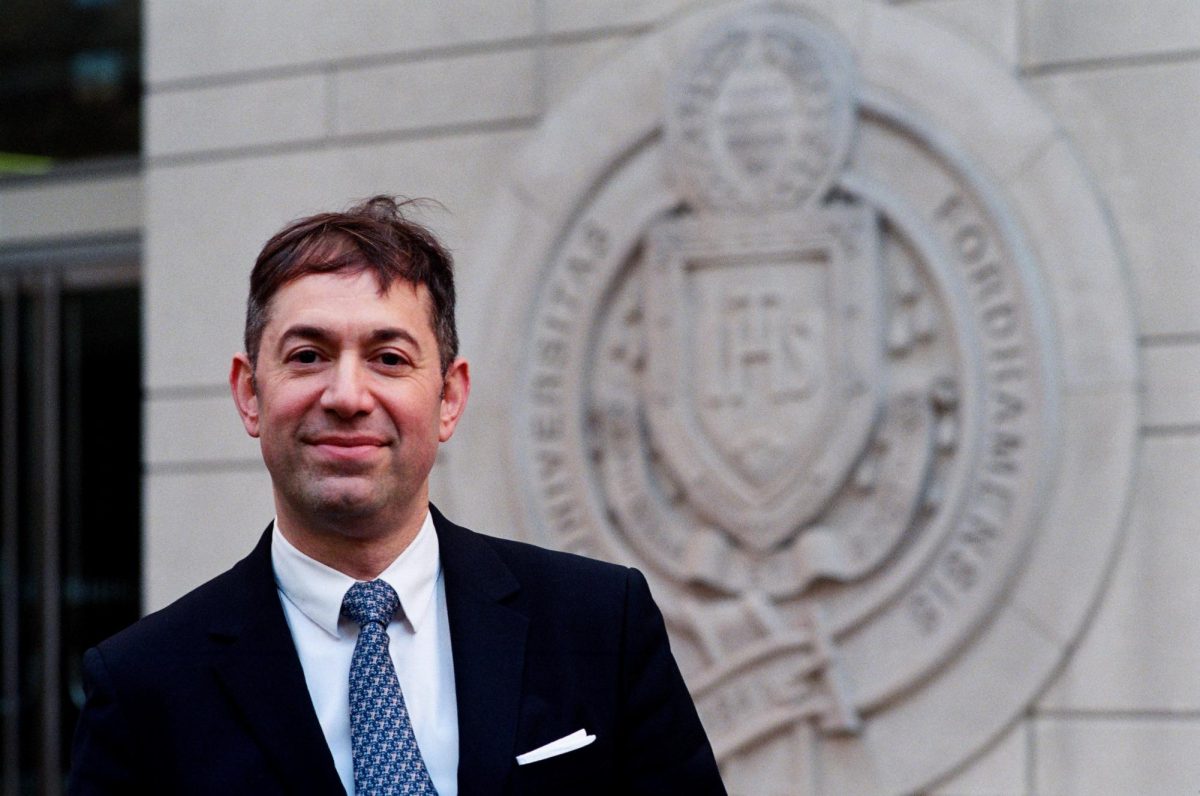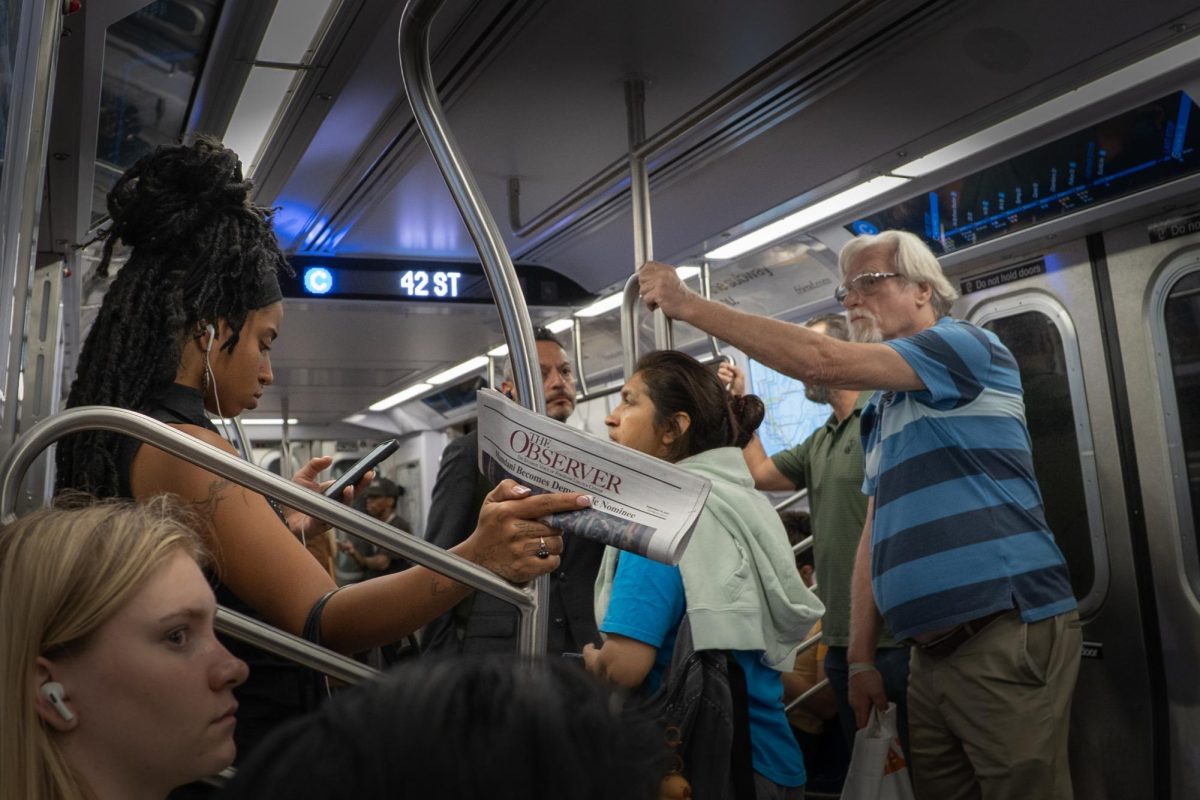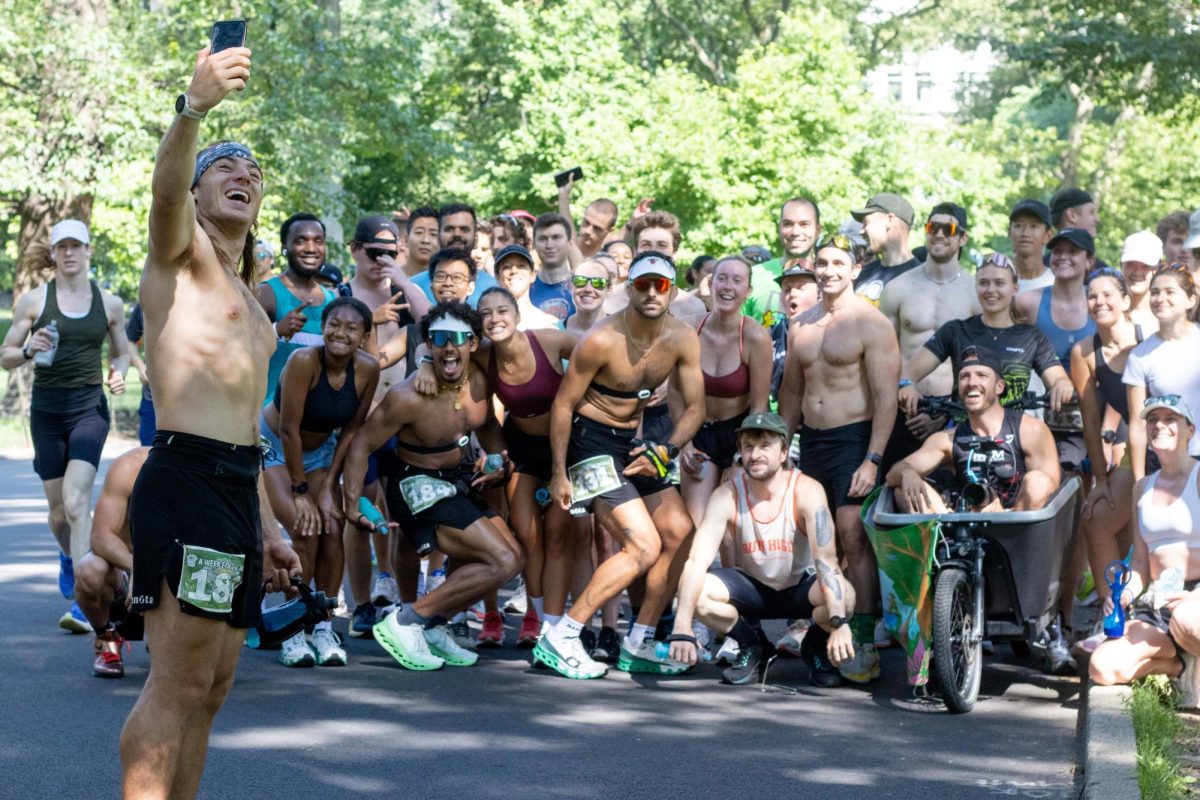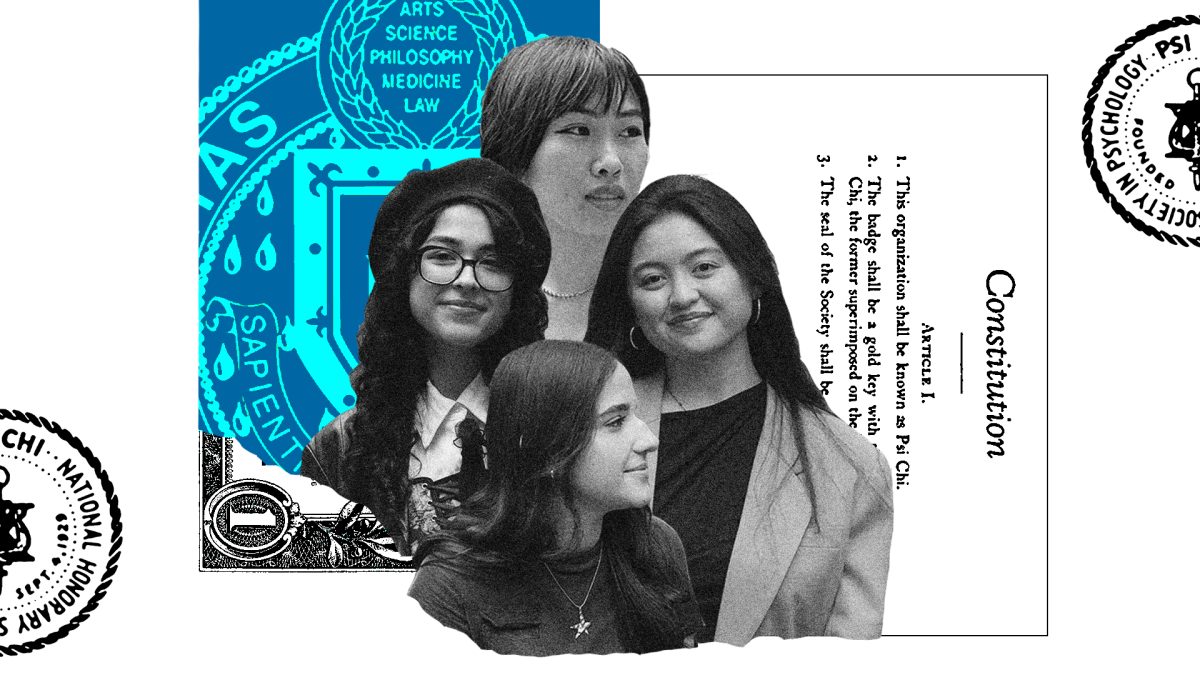Was Fordham Law’s New Dean ‘Born To Do This’?
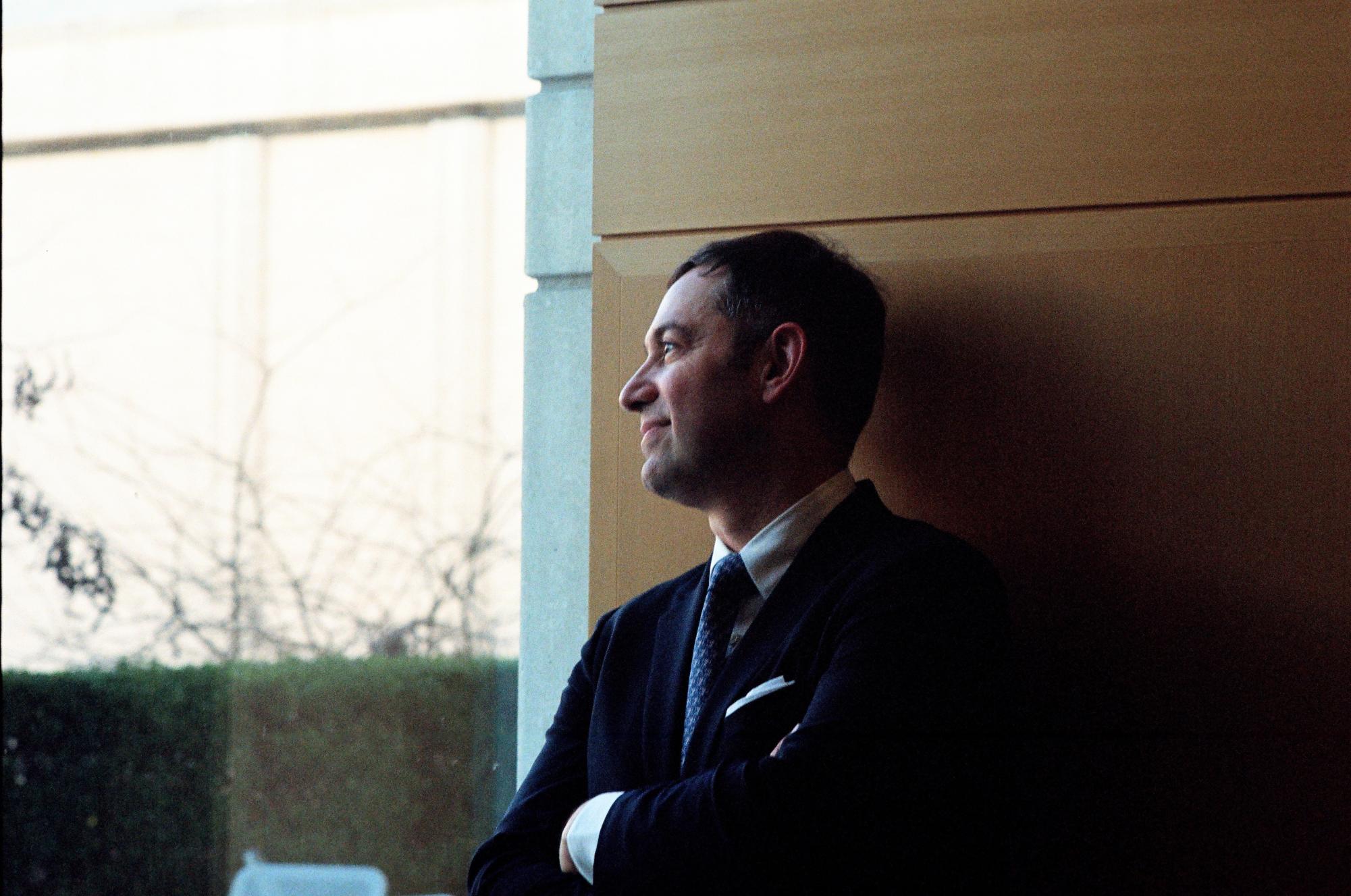
There’s a day in the hiring process for instructors at Fordham Law School that’s usually the most rigorous. A whole day of meetings, dinner with pertinent decision-makers, there’s questions and handshakes, small-talk and interviews. And in the middle of that day, candidates present, and then defend, one of their scholarly articles. The event is open to Fordham Law faculty, who are free to question and critique the paper. So, it’s a space for face-time with prospective future colleagues. But, like the rest of the process, this mid-day presentation — this “job talk” — can be nerve wracking.
More than a dozen years ago, Joseph Landau, Fordham Law School’s new dean, came well prepared for this process.
Fordham Law Professor Olivier Sylvain was a visiting instructor at the time. Along with Landau, he was applying for the position of Assistant Professor. He recalled that Landau’s preparation was intimidating. Sylvain said he watched as Landau hyped himself up before the presentation. He said that Landau’s preparation made him question his prospects. Sylvain said he thought “I’m not getting my job because this guy is really serious.”
The topic of Landau’s paper — the use of procedure in federal courts to force other branches to act in specific ways — is a complicated one. But his colleagues said his command of the material impressed the audience.
Fordham Law Professor Ian Weinstein said he remembered “what a strong presentation he gave.” All these years later, Weinstein could still recall “how impressed I was, and others were, with the substance of his work.”
The then dean of Fordham Law School, Bill Treanor, said he saw how the legal scholar engaged with the staff. “Everybody was so excited,” Treanor said. “He’s just the complete package.”
Many of Landau’s past and present colleagues have heralded his appointment.
Landau, after 14 years on the faculty, was selected as law school dean in February this year and began his official term July 1. He now leads an institution of around 1500 students and about 70 faculty. Among the school’s graduates are national legislators, such as Jerry Nadler (D. NY), and Staten Island Borough President Vito Fossella.
Many of his past and present colleagues have heralded his appointment. Sylvain said that “Joe was kind of born to do this.”
Actually, Landau was born into a world where someone like him, a married, gay man, would not hold an office of such stature. That would change as he grew up in the ’80s, attended college in the ’90s, and began practicing law thereafter.
He chaired the Board of Directors at a small advocacy non-profit in downtown Manhattan. He edited a prominent weekly news magazine in the nation’s capital. He clerked for judges. And he argued cases in front of them.
Yet, even when he was initially hired by this Jesuit Catholic institution in 2010, same-sex marriage was still illegal in the state of New York and across the country. In those days, Landau was only beginning his career in academia. Fellow legal scholars and advocates say that in those days the gates of power were shuttered. But when the doors finally did open to him, Landau was on the move.
Landau has a firm handshake and large brown eyes. His short hair sometimes spills over his forehead. He speaks clearly, with a measured gentleness. On a recent Thursday, he sat in his office’s conference room wearing a light blue tie dotted with the Fordham “F” and scales of justice.
“I’m in my sixth month. It’s a great role. This is a fantastic law school. I’m really enjoying it,” Landau said. “I’m getting to spend time with students, faculty, all of our professionals. I spend time with alumni. I hear about how important Fordham was for them.”
Landau is articulate, his cadence is seasoned — both are likely a result of his litigation experience at the law firm Cleary Gottlieb Steen & Hamilton LLP, and his time on his highschool debate team.
“Choosing Joe to be dean was the easiest decision I’ve ever made.” Tania Tetlow, President of Fordham University
In September, he was installed in an event at the Law School in front of friends, faculty, and other administration officials.
Fordham University President Tania Tetlow told the crowd that day that “choosing Joe to be dean was the easiest decision I’ve ever made.”
In his speech at the installation event, Sylvain mentioned that the 11-member search committee had a strong consensus on Landau’s appointment. “That’s the sort of thing that’s supposed to be private,” he recalled later. “The President, she ended up confirming it.”
Law schools represent a conglomeration of many different opinions and experiences. So they can often be divided around politics, direction or the best way to teach law.
“Joe was someone that everybody unified around, and in a way that it’s hard to find unification.” Michael Martin, Fordham Law Professor
One of Landau’s close colleagues, Law Professor Michael Martin, explained that Landau’s coalescing power is nothing to gloss over.
“Joe was someone that everybody unified around, and in a way that it’s hard to find unification,” Martin said. “That comes from substance. You can’t fake that. It’s hard to fool that many people.”
Landau’s capability and widespread trust were broadly visible to his colleagues. When his predecessor, Matthew Diller, began running the school in 2015, he “quickly realized that Joe was a leader, that he had great judgement and that he was deeply, deeply committed to serving students,” he said.
“When I came to that realization, it was not rocket science,” Diller clarified. “Joe’s talents are pretty apparent and were widely appreciated on the faculty.”
But Landau’s skills and commitment were apparent to those around him, even before he arrived at Fordham University.
Washington D.C. has a kind of energy to it, at least that’s how Landau said he thought of it after he graduated from Duke with a double major in political science and French. He began a job in the capital as an Associate Editor at The New Republic.
Landau’s first article, titled “Out of Order,” foreshadowed the work of his eventual career.
He said he was really interested in legal issues — especially those pertaining to LGBTQ+ rights. And at The New Republic, he said that he found himself on the cutting edge of that discourse. He said that LGBTQ+ rights “wasn’t a topic that was really being written about.” But soon after his article was published, the Supreme Court agreed to hear one of the cases he had cited.
From Associate Editor to Assistant Managing Editor, Landau spent about two years helping to guide the magazine as it wrestled with the most pertinent issues of the time. In 1999, he left the magazine. Landau said he simply wanted to be in the legal profession, not just write about it.
“The methodology of law, the practice of law, was fascinating to me,” he said.
Landau studied in New Haven, CT at Yale Law School. He said that he found the readings, the material, the rigor, “to be wonderful.”
Jean Tom, a former classmate at Yale, said that “you could almost see him as a law professor.” According to her, Landau’s suitability to be a leader in the profession was noticeable even then.
“He has that kind of thoughtful demeanor,” Tom said.
Another Yale Law student, Amy Meselson, became one of Landau’s close friends. They bonded over their shared sense of justice and advocacy.
“Amy was an amazing, amazing lawyer who dedicated herself completely to her clients,” Landau said. Meselson was, in his words, “an inspiration to me.”
In the spring of 2003, the Supreme Court heard Lawrence et al. v. Texas, wherein a Texas citizen was suing over the state’s penal code which criminalized homosexual sex.
As Landau was graduating from Yale, the fight for LGBTQ+ equality was gaining ground in the federal courts. In the spring of 2003, the Supreme Court heard Lawrence et al. v. Texas, wherein a Texas citizen was suing over the state’s penal code which criminalized homosexual sex. The court found the law to be unconstitutional.
“It was an exciting change,” Landau said. “I was delighted to write about it both before the opinion and after the opinion and it made a big difference in the everyday lives of people whether they were in court or not in court.”
By this point, Landau was working as an associate at the prestigious law firm Cleary Gottlieb Steen & Hamilton LLP. He had moved from New Haven to New York City, and celebrated as a newly-licensed lawyer.
At a holiday party of a law school friend, Landau said that he met Rachel Tiven. Tiven is a historian, scholar and legal advocate. In the late 2000s, she was also leading Immigration Equality, a legal advocacy organization fighting for LGBTQ+ immigrants
“He was already doing Asylum cases,” she remembered. “And I said ‘let’s have lunch,’ and we had lunch. And at lunch I said, ‘I think you should join the board at Immigration Equality.’”
As Landau and Tiven chatted, the next chapter of his life was looking him in the face.
A 1996 law, H.R. 3396, known as the Defense of Marriage Act (DOMA), defined marriage as strictly between “one man and one woman.” As a result, the Federal Government, bound by DOMA, could not issue green cards to same sex couples.
For many clients of Immigration Equality, “there was no way they could live together within the United States,” Tiven explained. “In some cases, there was no country in the whole world that that couple could live together.”
In the early years of the next decade, the tide of jurisprudence was moving in the direction of marital equality. 2011 saw the legalization of same-sex marriage in the State of New York. By then, Landau had already established himself as a central figure on Tiven’s Board of Directors.
Joan Garry, Tiven’s executive coach, and the former CEO of Gay and Lesbian Alliance Against Defamation (GLAAD), took a lunch with Landau in order to understand his approach to chairing the board.
“I thought this guy was a rockstar,” Garry said. “I went back to my coaching client and said, ‘Not only should you have no anxiety, but you should be jumping for joy for having somebody who really understands that this is an important job, understands his job to be a champion fundraiser for Immigration Equality.’”
“I thought this guy was a rockstar.” Joan Garry, Former CEO of GLAAD
A twin-engine jet — that is how Garry explains a productive working relationship between a CEO and her Board-Chair. One engine, the CEO’s, is tasked with the daily operations, the advocacy, the trials, the staff. The other engine, the Board-Chair’s, is driving the board, developing strategies to get as much wisdom, time and money from his trustees as possible.
“Joe and Rachel really worked with that board to understand its fundraising obligation. Both to give generously as well as to secure relationships with people who might want to donate,” Garry said.
A lot of this was “thankless” work, as Tiven put it. And the fact that Landau was doing it for free meant that “he cared very much about the work we did,” she said.
Soon, that energy would make the institutional barriers crumble. The hurdles Landau helped Immigration Equality jump so often would capitulate to his own ascendency.
In the last year of Landau’s time as Board-Chair, the Supreme Court faced the question of DOMA’s same-sex marital-restricting definitions head on.
One New York State resident, Edith Windsor, was taxed more than $360,000 on the bequeathment of her late wife Thea. Though New York recognized their marriage as legitimate, DOMA still meant marriage benefits — federal estate tax exemption — were restricted to heterosexual couples.
President Barack Obama’s Justice Department declined to defend the restrictive legislation, illustrating ongoing institutional change. A slim majority found Section 3 of DOMA to be unconstitutional.
Reflecting now, Landau said “it felt like the Supreme Court recognized something that I had always understood to be true.”
Two years later, to the day, the Supreme Court ruled in favor of Jim Obergefell and almost 30 other plaintiffs from across the country.
“It felt like the supreme court recognized something that I had always understood to be true.” Joseph Landau, Dean of Fordham Law School
“The Court now holds that same-sex couples may exercise the fundamental right to marry in all states; no longer may this liberty be denied to them,” Justice Anthony Kennedy opined in the majority decision. “The challenged laws excluding same-sex couples from marriage cannot stand under the Constitution,” he said that day.
In the aftermath of Windsor and Obergefell, Landau wrote in Fordham Law Review that the “momentum toward Full LGBT rights only seems to be increasing within the political branches.”
In the middle of July 2018, Meselson — Landau’s closest law school classmate — took her own life. Landau wrote an obituary for The Liman Center Reports, the magazine of a Yale-based public-interest fellowship program. “I vividly remember my first conversations with Amy in the Fall of 1999 when we began our studies at Yale,” he wrote. “She became my best friend in law school.”
He helped gather alumni to support a subsidiary fellowship in Meselson’s name, specifically focused on immigration advocacy.
As Landau put it, he was “involved” in its creation.
But as Tom, the former classmate explained, Landau “made it a point to get a bunch of us together to sponsor a public interest fellowship in her name. That’s just the kind of person Joe is,” she said.
Landau’s fellow advocates see his recent appointment as a major accomplishment. Tiven said that it represented a tremendous shift in the culture.
Tiven’s mentor Garry, who is a Fordham alumna herself, said that she was proud her alma mater “had seen and understood that Joe Landau does, in fact, embody Jesuit values — in addition to being the right guy for the job.”
These scholars and activists have watched institutions become increasingly willing to interface with people who openly love like them. When Garry attended Fordham as an undergraduate in the late ’70s, she would often say that the closest thing to a gay-straight alliance the university had was the drama and theatre club.
“I don’t know that I knew any out students. I clearly did not know any out faculty,” Garry said. “There were no models. I did not feel seen, and it felt far too risky to be open.”
Tiven too said the idea that Fordham would have an out, gay man as the dean of its law school was “unimaginable when Joe and I started law school in the late ’90s, early 2000s.” At the same time, however, it’s “not surprising at all.” She said that “it reflects the commitment to love and to justice that’s totally core at Fordham.”
“I don’t know that I knew any out students. I clearly did not know any out faculty. There were no models. I did not feel seen. And it felt far too risky to be open.” Joan Garry, FCRH ’79
Garry described it as a homecoming to Fordham’s Jesuit values of whole-person care and societal justice.
“They’re bringing those to life by selecting an openly LGBT person to run the law school,” she said. “It sends a message of belonging.”
Now, halfway through the first year on the job, Landau’s pondering how he wants to use his influence. Landau said he wants to uphold that mantle, and make it more affordable.
“Legal education is expensive,” he said, “and we want to make it as accessible to as many people as possible.” He said that he hopes to help Fordham Law students “live out and fulfill their dreams,” Landau explained. “That’s what we want to do.”
He also is a proponent in the area of congenial discourse.
Landau said he hopes to help Fordham Law students “live out and fulfill their dreams.”
Landau said that “when you’re in an actual, live legal environment, there are usually people on opposite sides of the v. in the litigation — coming together on opposite sides of a deal. And lawyers, to be fully prepared and to thrive, have to be able to deal with that complexity.”
Such a focus will be challenging, he said. But in a way, through navigating a media organization, heading the board of a non-profit and driving students to think deeper about law and procedure, he’s spent his entire career dealing with challenging issues.
Disagreeing, but still communicating respectfully, is an abstract skill until the moment it’s absolutely necessary. And how Landau describes it, it’s an actively hard thing to maintain. “That is a challenge of the moment,” he said. “I think it’s a challenge that we’re up for navigating.”
